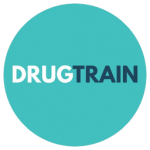As a part of putting together the new website, Kim Scotland, the web developer I worked with did some research into the terms that people google when they are looking for training. It was pretty interesting to see and led to me to reflect about the terminology that I wanted to use on the website to optimise those all important google hits, it was challenging as the majority of the terms that people use are really not the kind of language that I would typically use and this perhaps reflects more widely the need for ongoing discussion about language and terminology within this sector. Increasingly there is a recognition that much of the language that is used across the sector could be seen as stigmatising, but, as with language in many other areas of society it is proving difficult for professionals, people who use drugs and others to adapt this changing language.
Searches for ‘drug training’ were not commonly used by people looking for the kind of training that Drugtrain offers. What is seen are many searches based around terms related to ‘substance misuse training’, this is understandable as generally the treatment services in the sector are seen as ‘substance misuse services.’ We saw searches for, ‘substance abuse prevention training’, ‘substance abuse specialist training’,’ drug and substance abuse training’,’ substance abuse counsellor training’,’ substance abuse professional training’ and many other variations on these. The highest number of google searches were for ‘substance misuse worker training’.
I was clear that Drugtrain would not use this kind of terminology on the website or in any other promotional materials. My view, and one that is often discussed in training workshops is that people do not misuse substances, they use them. Likewise, it goes without saying that people don’t abuse drugs and using the language of abuse to describe substance use isn’t a helpful approach. This kind of terminology could be seen as moralistic and judgemental. They are inaccurate terms as people who are using drugs are not using products for a purpose for which they are not designed. Substances are used for their psychoactive effects. There is often a distinction made for people who are using pharmaceutical products in ways that goes against the advice of the prescriber, the counter view to this is that this is that this is stigmatising as it focuses on the person behaviour and contains an element of judgement that people are acting in ways that a prescriber has not recommended. The one substance where there may be a case to be made that they are being misused is in the case of solvents and gases, products that are sold for a wide range of reasons but that are then used to gain a psychoactive effect, however the term ‘misuse’ is applied much more broadly to a wider range of substances other than gases and solvents.
There were a small number of searches for ‘substance use training’. Hopefully as services and professionals use of language shifts, we will see this term used much more than seeing a persons relationship with drugs as ‘misuse’.
The next largest group of searches were all variations of ‘drug addiction counselling courses.’ Those of you who work in this sector will know that historically drug workers may have been referred to as counsellors but that there has been a shift over the last decade or so to using terms like Recovery workers or navigators and describing the work that they do as psychosocial interventions rather than counselling. For people searching for training though this perhaps isn’t recognised, with many searches using terms such as ‘training for alcohol and drug counsellor’,’ drug addiction counselling courses’,’ drug counselling courses’ or ‘addiction counsellor training.’ Despite my misgivings around the term, I eventually decided to use ‘drug and alcohol counselling’ courses on the website to improve the search engine optimisation, being that this is a term that people looking for training are often searching for. To be clear, Drugtrain doesn’t offer training to become a counsellor, but we do offer motivational interviewing and other basic counselling skills training that people can utilise in the delivery of psychosocial interventions.
There is also a wider conversation to be had about the term addiction itself. Increasingly this term is contested for reasons covered on many Drugtrain courses. The word addiction has a range of different meanings and there is no real agreement about what it refers to. As a medical diagnosis addiction is taken to mean a chronic, relapsing disease characterised by compulsive drug seeking and use, despite serious adverse consequences, and by long-lasting changes in the brain. Generally, I try to use the terms physical or psychological dependency in place of addiction. Neither of those terms were used by people using google to search from training courses.
The highest number of searches are for ‘drug and alcohol misuse training’&’ drug and alcohol misuse courses.’ The advice I was given was that including these terms on the Drugtrain website would greatly improve the search engine results, despite this I was unwilling to utilise these terms, for reasons I mentioned earlier.
So, what can we learn from this? It seems clear to me that there is a growing need for the sector to get to grips with the language and terminology it uses, especially given the increased focus on stigma and the understanding of the ways that language can contribute to that. In many ways much of this work has already been done. The International Network Of People Who Use Drugs ( INPUD) published the Words matter guidance a few years ago which is well worth reading, it can be found here: Words-Matter-Language-Guide-1.pdf (inpud.net). There is also the comprehensive publication from the Scottish Drugs Forum, Moving Beyond People First Language, which can be read here: Moving-Beyond-People-First-Language.pdf (sdf.org.uk). I would urge anyone who hasn’t done so to read both of these excellent guides. There are many other areas of language that I will perhaps consider in future blogs. I think the key factor for us all to recognise is that language is always evolving and all of us should consider how our choice of language might impact on the people that we work with. I’m hopeful that in a few years we might see google searches for ‘substance use training’ or ‘working with people who use drugs.’
Until then Drugtrain courses will continue to acknowledge and make space for these important discussions as we talk about drugs and people that use them.

